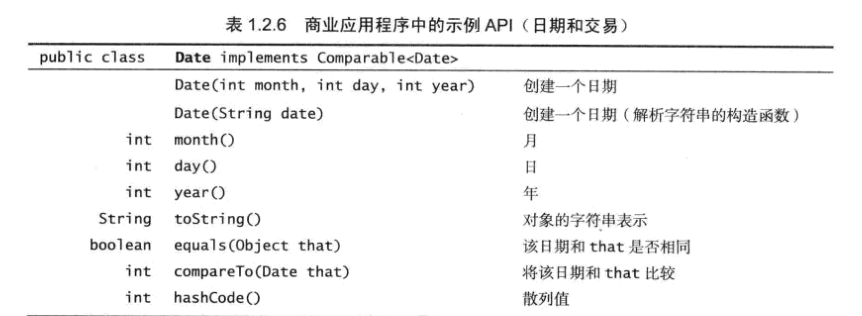习题1.2.11
根据Date的API实现一个 SmartDate 类型,在日期非法时抛出一个异常。
要点分析
1. Date
Date类的API如下(课本第48页):
Date类的实现如下(课本第56页):
public class Date {
private final int month;
private final int day;
private final int year;
public Date(int m, int d, int y) {
month = m;
day = d;
year = y;
}
public int month() {
return month;
}
public int day() {
return day;
}
public int year() {
return year;
}
public String toString() {
return month() + "/" + day() + "/" + year();
}
public static void main(String[] args) {
String s = new Date(3,19,1997).toString();
System.out.println(s);
}
}
输出:
3/19/1997
2. 异常
关于Java异常相关的知识,课本上并没有详细解释,这里也不再赘述,详解可以查看Java异常处理,本题主要用到抛出异常这个知识点。
那么本题中的"日期非法"有哪几种情况呢?
2.1. 非数字
比如我们输入的是三,十九,一九九七,但是该类异常需要在测试类中捕获,所以不在本题的范围内
2.2. 平年闰年
比如2018年2月29日是非法的,闰年2月有29天,平年2月只有28天
2.3. 不存在的日期
比如2018年13月33日是非法的
关于日期主要存在以上几种异常,那么我们如何捕获这些异常呢?
首先,我想到的便是创建一个单独的方法,将年月日挨个使用if else 判断,实现起来比较麻烦。其实我们可以将一个日期转换为字符串再转换成日期,然后采用SimpleDateFormat类的parse方法进行判断[1] ,如果转换不成功,就会出现异常。
public static boolean isValidDate(String str) {
boolean convertSuccess=true;
// 指定日期格式为四位年/两位月份/两位日期,注意yyyy/MM/dd区分大小写;
SimpleDateFormat format = new SimpleDateFormat("yyyy/MM/dd HH:mm");
try {
// 设置lenient为false. 否则SimpleDateFormat会比较宽松地验证日期,比如2007/02/29会被接受,并转换成2007/03/01
format.setLenient(false);
format.parse(str);
} catch (ParseException e) {
// e.printStackTrace();
// 如果throw java.text.ParseException或者NullPointerException,就说明格式不对
convertSuccess=false;
}
return convertSuccess;
}
参考答案
import java.text.ParseException;
import java.text.SimpleDateFormat;
public class Date implements Comparable<Date> {
private final int month;
private final int day;
private final int year;
public boolean isValidDate(String str) {
boolean convertSuccess = true;
SimpleDateFormat format = new SimpleDateFormat("yyyy/MM/dd");
try {
format.setLenient(false);
format.parse(str);
} catch (ParseException e) {
convertSuccess = false;
}
return convertSuccess;
}
public Date(int month, int day, int year) {
String str = year + "/" + month + "/" + day;
if (!isValidDate(str)) {
throw new IllegalArgumentException(month + "/" + day + "/" + year + "不合法");
}
this.month = month;
this.day = day;
this.year = year;
}
public Date(String date) {
if (!isValidDate(date)) {
throw new IllegalArgumentException(date + "不合法");
}
//如果final变量选择在构造函数中初始化,那么当类有多个构造函数时
//需要在每个构造函数中都对这个final变量进行初始化
String[] fields = date.split("/"); //正则表达式
month = Integer.parseInt(fields[0]);
day = Integer.parseInt(fields[1]);
year = Integer.parseInt(fields[2]);
}
/* public boolean leap_year(int m, int d, int y) {
if (year % 4 == 0 && year % 100 != 0 || year % 400 == 0) {
return true;
}
return false;
}*/
public int month() {
return month;
}
public int day() {
return day;
}
public int year() {
return year;
}
@Override
public boolean equals(Object o) {
if (this == o) return true;
if (!(o instanceof Date)) return false;
Date date = (Date) o;
return month == date.month &&
day == date.day &&
year == date.year;
}
@Override
public int hashCode() {
int hash = 17;
hash = 31*hash + month;
hash = 31*hash + day;
hash = 31*hash + year;
return hash;
}
@Override
public String toString() {
return month() + "/" + day() + "/" + year();
}
@Override
public int compareTo(Date that) {
if (this.year < that.year) return -1;
if (this.year > that.year) return +1;
if (this.month < that.month) return -1;
if (this.month > that.month) return +1;
if (this.day < that.day) return -1;
if (this.day > that.day) return +1;
return 0;
}
public static void main(String[] args) {
System.out.println(new Date(2, 29, 2000).toString()); //合法
System.out.println(new Date(2, 290, 2001).toString()); //不合法
System.out.println(new Date(200, 29, 2001).toString());//不合法
}
}
参考资料
[1] 孤傲苍狼



请登录之后再进行评论